Blood In Cat Stool: What It Means and Is It An Emergency?


Discovering blood in your cat’s stool can be distressing and stressful. However, it is essential to remember that the presence of blood in cat stool can be due to various reasons, ranging from minor to severe.
Hence, you need to know the potential causes of a cat having blood in its stool to know when to seek veterinary care and when the condition can be treated at home.
So, if you are worried about “why my cat has blood in his stool,” this article will shed light on various reasons behind this symptom. In addition, we also talk about possible underlying conditions and guide you on when to consider it an emergency. So read on.
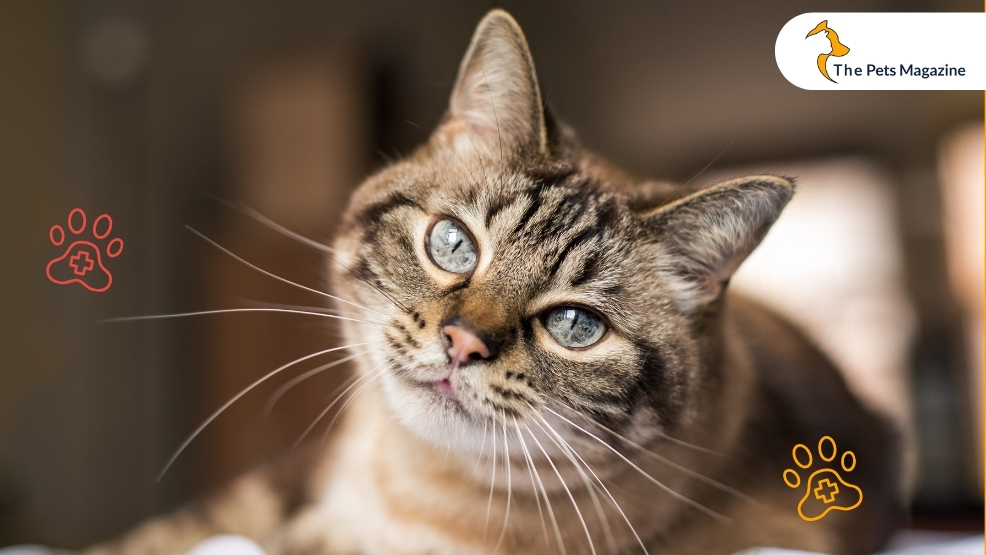
Common Causes of Blood in Cat Stool
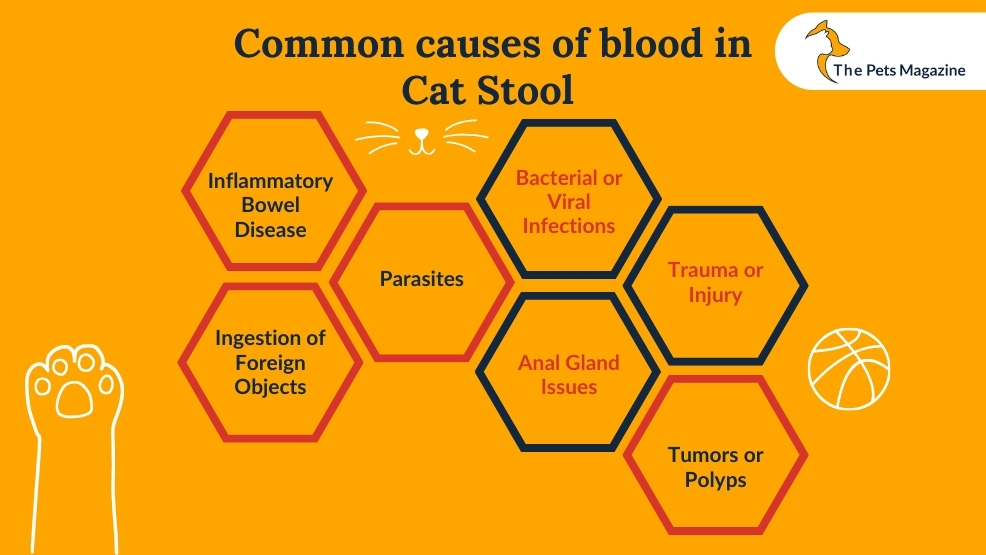
Several factors can be responsible for blood in a cat’s stool. Here are some of the common culprits:
- Inflammatory Bowel Disease (IBD): IBD is a chronic condition that causes inflammation in the gastrointestinal tract, leading to bloody stools, diarrhea, and weight loss.
- Parasites: Intestinal parasites of cats, such as roundworms, hookworms, and coccidia, can irritate the lining of the digestive system, resulting in bloody stools.
- Bacterial or Viral Infections: Certain bacterial or viral infections, like salmonellosis or feline panleukopenia, can cause inflammation and bleeding in the intestines.
- Ingestion of Foreign Objects: Cats are curious creatures and may accidentally ingest non-food items, such as strings, plastic, or other objects, which can cause intestinal blockages or lacerations, leading to bloody stools. Indoor plants such as money plants are also toxic to cats so keep them out of their reach.
- Anal Gland Issues: Impacted or infected anal glands can cause inflammation and bleeding, resulting in blood in the stool or around the anus.
- Trauma or Injury: Blunt force trauma or injuries to the abdomen or rectum can cause internal bleeding and lead to bloody stools.
- Tumors or Polyps: Growths or polyps in the digestive tract can bleed and cause blood to appear in the stool.
Additional Signs and Symptoms to Look Out For
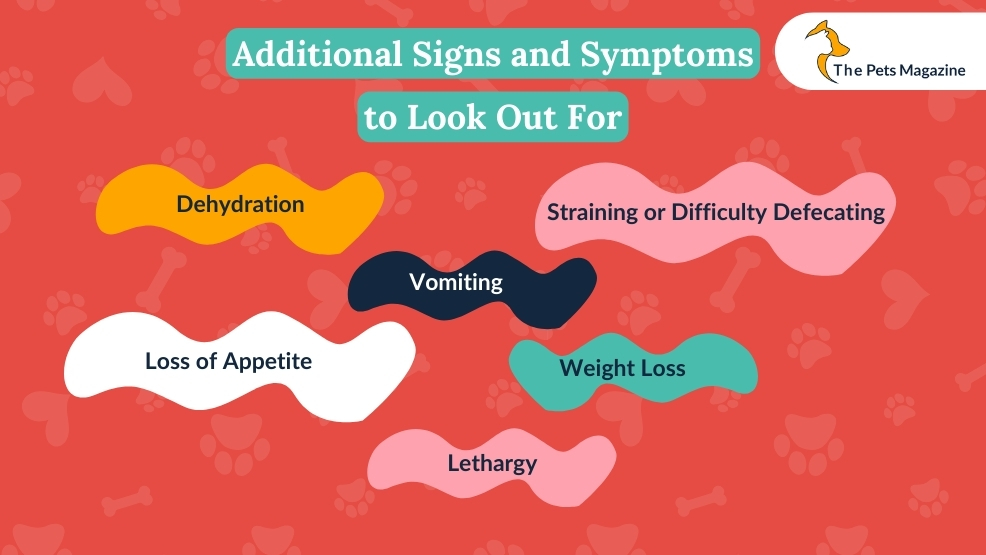
In addition to the presence of blood in your cat’s stool, there may be other signs and symptoms that can help you to know if your cat is sick . You need to know these signs to understand the severity of the situation and determine the appropriate course of action. Here are some common signs and symptoms to watch out for:
- Diarrhea: Bloody diarrhea is a common symptom associated with many digestive issues that cause blood in the stool.
- Vomiting: Some conditions that lead to bloody stools may also cause vomiting, which can be accompanied by blood. You may notice your cat throwing up white foam due to parasites, irritable bowel disease, or eating too fast.
- Weight Loss: Chronic digestive issues can lead to malnutrition and subsequent weight loss.
- Loss of Appetite: Cats may experience a decreased or complete loss of appetite due to the underlying condition causing the bloody stools.
- Lethargy: Digestive issues and blood loss can cause your cat to become lethargic and less active than usual.
- Dehydration: Diarrhea and vomiting can lead to dehydration in cats, which can be identified by signs such as sunken eyes, dry gums, and decreased skin elasticity.
- Straining or Difficulty Defecating: If your cat is straining or having difficulty defecating, it may indicate an obstruction or other issue in the digestive tract.
If you notice any combination of these signs and symptoms and blood in your cat’s stool, you should take your cat to the vet’s clinic as soon as possible.
When Should You Be Concerned About Blood in Cat’s Stool
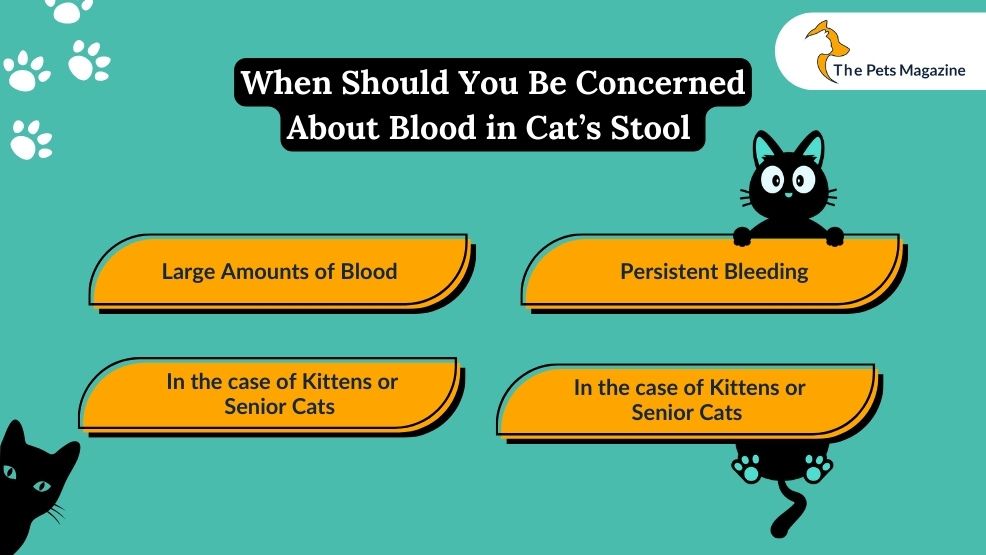
While blood in your cat’s stool can be concerning, not all cases require immediate veterinary attention. However, there are certain situations when you should seek prompt medical care:
Large Amounts of Blood
If you notice a significant amount of fresh, bright red blood in your cat’s stool, it could indicate a severe issue, such as a gastrointestinal bleed or trauma, and requires immediate veterinary attention.
Persistent Bleeding
Suppose the bloody stools persist for more than a day or two. In that case, it’s essential to have your cat evaluated by a veterinarian, as it may indicate an ongoing or chronic condition.
In the case of Kittens or Senior Cats
Kittens and senior cats may be more susceptible to dehydration and other complications associated with bloody stools, so it’s essential to have them evaluated by a veterinarian as soon as possible.
Underlying Health Conditions
If your cat has a pre-existing health condition, such as diabetes, kidney disease, or cancer, the presence of blood in the stool may be more concerning and require immediate attention.
Remember, it’s always better to be safe than sorry when it comes to your cat’s health. If you’re unsure or have any concerns, don’t hesitate to consult your veterinarian for proper evaluation and guidance.
How to Treat Blood in Cat Stool?
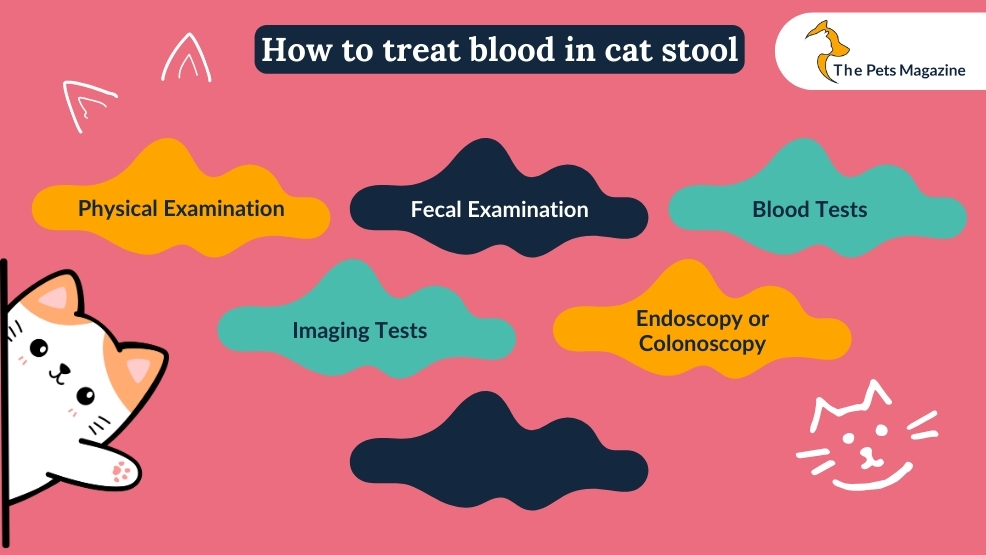
When a cat has blood in its stool, your veterinarian may recommend various diagnostic tests to determine the underlying cause. These tests can help pinpoint the source of the bleeding and guide appropriate treatment. Here are some standard diagnostic tests your veterinarian may perform:
- Physical Examination: Your veterinarian will perform a thorough physical examination, including palpating the abdomen, checking for signs of dehydration, and assessing your cat’s overall health.
- Fecal Examination: A fecal sample will be analyzed under a microscope to check for parasites, bacterial or viral infections, or other abnormalities.
- Blood Tests: Blood tests, such as a complete blood count (CBC) and biochemistry panel, can help detect underlying conditions, infections, or abnormalities contributing to the bloody stools.
- Imaging Tests: Depending on the suspected cause, your vet may prescribe imaging tests, such as X-rays or ultrasounds, to get an image of the digestive tract and identify any obstructions, masses, or other abnormalities.
- Endoscopy or Colonoscopy: In some cases, your veterinarian may recommend an endoscopic or colonoscopy examination, which involves inserting a small camera into the digestive tract to visualize and potentially biopsy any areas of concern directly.
- Biopsy: If a mass or abnormal growth is detected during imaging or endoscopy, your veterinarian may recommend a biopsy to determine the nature of the development and rule out potential cancers or other severe conditions.
You should follow your veterinarian’s recommendations and advice and allow them to perform the necessary diagnostic tests. This will enable them to accurately diagnose and treat the underlying cause of the bloody stools. Early detection and proper treatment can often lead to a better prognosis and improved quality of life for your cat.
Home Remedies for Blood in Cat Stool
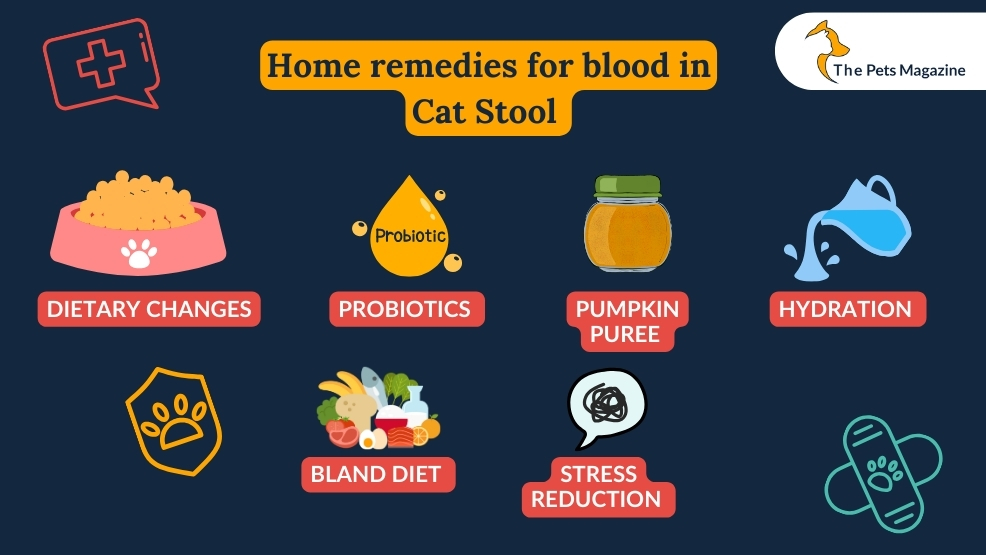
While some cases of blood in cat stool may require veterinary intervention, there are specific home remedies that you can try to alleviate mild or temporary digestive issues. However, it’s essential to consult with your veterinarian before attempting any cat care remedies at home, as some conditions may worsen without proper treatment. Here are some potential home remedies to consider:
Dietary Changes
If your cat has recently experienced a diet change or has been consuming a new type of food, it may be causing digestive upset and bloody stools. Gradually transitioning back to their previous diet or trying a different high-quality cat food may help resolve the issue.
Probiotics
Introducing probiotics, such as those found in plain, unsweetened yogurt or specialized probiotic supplements for cats, can help restore the balance of beneficial bacteria in the digestive tract and aid digestion.
Pumpkin Puree
Pumpkin Puree is a natural source of fiber that can help regulate bowel movements and soothe the digestive tract. Add a small amount (1-2 teaspoons) to your cat’s food or offer it as a treat.
Hydration
Ensuring your cat stays well-hydrated is crucial, especially if they are experiencing diarrhea or vomiting. Always offer fresh, clean water and consider providing low-sodium chicken broths or electrolyte-enhanced water to help replenish fluids and electrolytes.
Bland Diet
If your cat is experiencing digestive upset, a bland diet of boiled chicken or turkey and plain, cooked white rice can help soothe the digestive tract and allow it to rest and recover.
Stress Reduction
Stress can contribute to digestive issues in cats, so providing a calm and comfortable environment and plenty of playtime and attention may help alleviate stress-related digestive problems.
It’s important to note that while these home remedies may provide temporary relief, they should not be used as a substitute for professional veterinary care, especially if the bloody stools persist or worsen. If your cat’s condition does not improve within a day or two, or if you notice any additional concerning symptoms, it’s crucial to seek veterinary attention promptly.
Final Thoughts
Discovering blood in your cat’s stool can be a concerning experience for any cat parent, but it’s important to remember that it doesn’t always indicate a life-threatening condition. Some cases may be easily resolved with home remedies or dietary adjustments.
But if you notice persistent or severe bleeding, and other concerning symptoms, you should immediately consult your veterinarian before attempting any self-treatment. This is because early intervention and proper care can significantly affect your cat’s quality of life and long-term well-being.








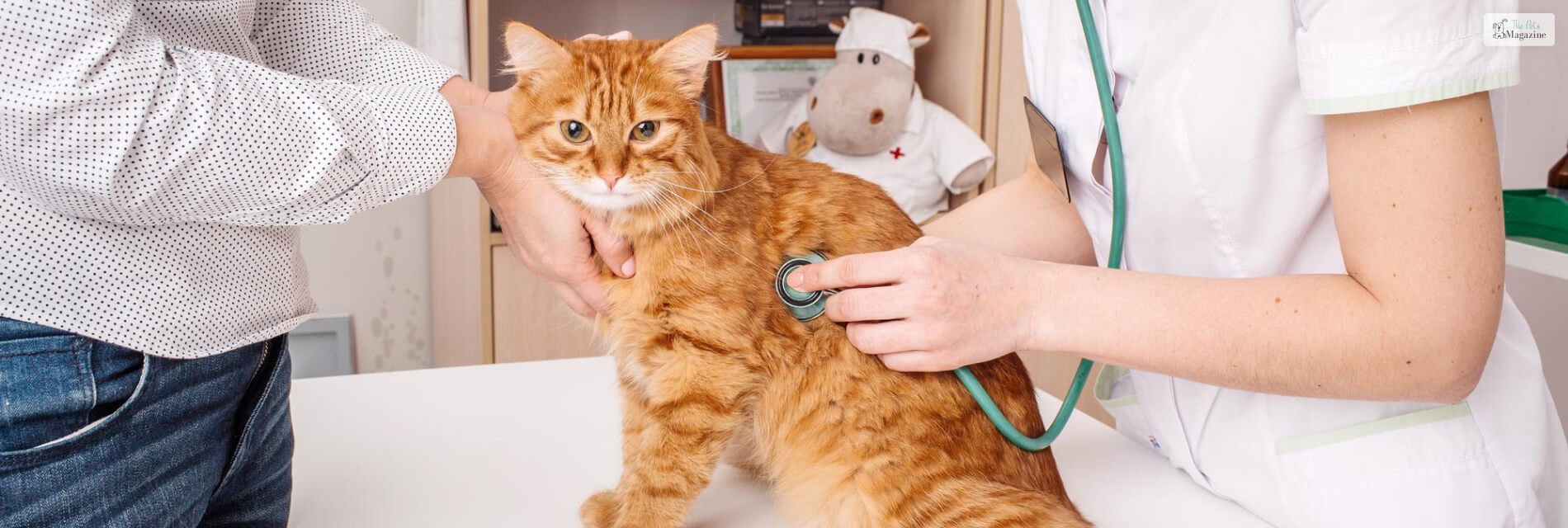
Leave A Comment